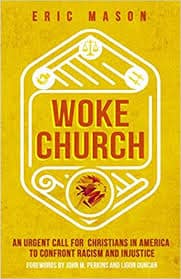I wanted to make just a few bullet points about Eric Mason’s second chapter. I already addressed one of the difficulties from this chapter in my first post on all this, but there are a few other things that need to be mentioned.

First, he says a number of true, just, and orthodox things. Much of what he says is quite good. For example: “But in the gospel, man is not just reconciled to God by faith. Man is also reconciled to man by faith” (Loc. 544). “We will all be called into account for how we reflected His character in justice. How did we discipline our children? What was our work ethic? How did we treat employees? Did we speak out against injustice? Did we act justly?” (Loc. 727). There were many things that warranted nothing but solid amens. So amen to all of that.
Second, as I pointed out in my first post, his language when it comes to justification and justice is quite muddy. Granted that these things are all related, a great deal rides on how they are related. He says that justification is “both intrinsic and extrinsic.” (Loc. 603). He says it is both “an attribute and an action” (Loc. 603). But what does that even mean? Mason is very imprecise here, and given how Lig Duncan and others would be all over these issues—like a duck on a June bug—if it were N.T. Wright saying them, it is really curious to me how all this is going down. FV was a big problem, but woke FV is apparently okay?
Third, Mason places great emphasis on reconciliation. The Lord as much as says “until you move toward reconciliation, I’m going to lean on you” (Loc. 550). That being the case, I would like to invite Eric Mason to address the entire student body of New St. Andrews. No restrictions would be placed on what he might want to say to us, and his travel and honorarium would be at our expense. We would want to take the occasion to ask questions, whether publicly or privately or both. We would be happy to work all such details out with him.
And last, we get to what I think will be the main problem that will recur throughout this book. We set the stage by recognizing that in the Scriptures, justice is a good word, not a bad one.
“The Bible is filled with justice as a main theme” (Loc. 684).
Agreed. But then he says this.
“Unfortunately, today justice seems to be seen as a ‘liberal’ word, not a word that pervades the Scripture” (Loc. 682).
The problem is not the word. The word is great, and thrones are established by righteousness (Prov. 16:12). But we can’t just take a Bible word, and fill it up with definitions that come from a source other than exegesis, and claim that the results somehow mean that the Bible is advocating this new left-of-center agenda. Here is his description of life in the inner city, and he lists six problems.
“I see fatherlessness, violence literally on our front steps, educational challenges, gentrification, redlining, and the poor having very little access to healthy food options, which impact education and mortality” (Loc. 739).
With some of his points, we see the scriptural relevance right away (e.g. violence—Gen. 6:11). But gentrification? And redlining is when someone has trouble getting a loan or insurance because they live in an area that flags them as a poor financial risk. So biblical justice requires companies to make loans that their actuarial tables define as too risky? Biblical justice requires them to place crazy bets in defiance of their shareholders’ best interests? If the church is woke, does that require the insurance companies to go to sleep?
“Ignoring injustice isn’t a sign of being an authentic believer. Particularly, ignoring systemic injustice” (Loc. 746).
Now I agree that there is such a thing as systemic injustice. Roe v. Wade is an example of it. And I also agree that there is such a thing as complicity with systemic injustice, like voting for Obama. But the fact that there will be howls of protest over my examples of systemic injustice should indicate to us that we ought not to smudge things together in a way that makes careful discussion impossible. All Christians should be able to agree that murder is evil, as is abandoning your own children. Blurring such things together with yuppies buying old houses in the inner city is a premier example of how liberals ought to be challenged on it whenever they talk about a “systemic” anything.

